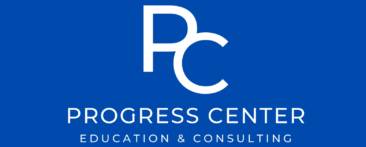Very Important Participation (VIP) Erasmus+ Project: Youth Engagement in the Political Process
About the Project
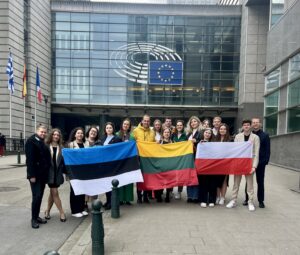
The Very Important Participation (VIP) project, implemented by Progress Center in collaboration with the Social Sustainability Academy (Lithuania) and Reflection on Europe (Poland), aimed to foster European values and encourage youngsters to vote in European Parliament elections. Funded by the Erasmus+ program of the European Commission, this project created a platform for dialogue between young people and politicians, engaging them in discussions on key issues affecting their future.
Main Objectives of the Project:
1.Analyzing European Parliament elections in partner countries.
2.Fostering interest in European Union processes among youth.
3. Organizing local awareness activities for European Parliament elections.
Key Project Activities
Debates with Candidates for the European Parliament
On May 24, 2024, Progress Center organized debates with candidates for the European Parliament, giving young people the opportunity to ask questions and express their opinions on youth policy issues. The event featured candidates from various political parties, including Maria Jufereva-Skuratovski (Reform Party) and Vsevolod Jürgenson (independent candidate). Despite the limited number of speakers, the event gained significant attention thanks to a live broadcast on Facebook.
Topics Discussed:
- Youth participation in politics: How to motivate young people to be active citizens?
- Voting age: Should the voting age be lowered to 16 in Estonia?
- Integration of Russian-speaking youth: What steps are necessary for successful integration into Estonian society?
Educational Visit to Brussels
In March 2024, representatives of the VIP Erasmus+ project visited the European Parliament in Brussels. This visit provided participants with the opportunity to learn about the work of European institutions, meet with MEP Marina Kaljurand, and discuss issues related to youth policy at the European level.
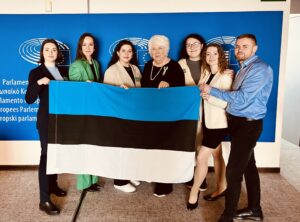
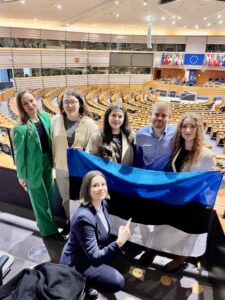
Research on Youth Political Engagement
As part of the VIP Erasmus+ project, research was conducted to examine the level of youth engagement in political life. Young people from different regions of Estonia were surveyed to understand their attitudes towards political processes, barriers to participation, and motivating factors for political activity.
Key Findings of the Research:
- Low level of engagement: A significant portion of young people were not interested in politics and did not feel part of the decision-making process.
- Lack of information: Many young people were unaware of opportunities to influence politics through youth organizations and civic initiatives.
- Role of social media: Most respondents received political information through social media, but they often struggled to distinguish reliable sources from manipulative ones.
- Demand for dialogue: Young people expressed a need for more open communication with politicians and wanted to see real changes in youth policy.
The results of the study were used to develop recommendations for increasing youth participation in political processes and served as the foundation for future VIP Erasmus+ initiatives. More about Analysis: https://rozprawyoeuropie.eu/wp-content/uploads/2025/03/Final.pdf
Collaboration with Youth Centers and Schools
The project actively collaborated with youth centers in Estonia, organizing thematic discussions, seminars, and training sessions. Special emphasis was placed on involving young people in youth organizations affiliated with political parties, enabling them to influence decision-making and youth policy development.
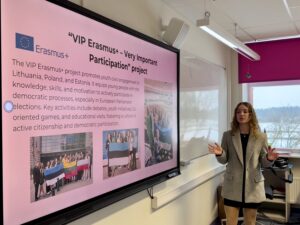
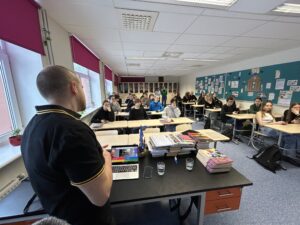
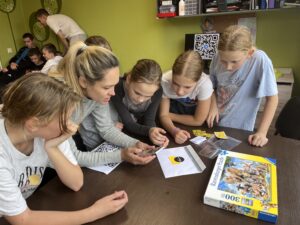
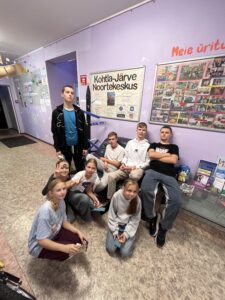
Key Aspects of Working with Youth:
- Educational training on the fundamentals of democracy and political participation.
- Discussions with experts and politicians.
- Support for youth initiatives.
- Creation of open spaces for discussing socially significant topics.
Results and Future Prospects
The VIP Erasmus+ project achieved significant results:
- Young people had the opportunity to interact directly with politicians and ask important questions.
- Awareness of opportunities for political participation was expanded.
- Educational activities were conducted to enhance youth knowledge of democracy and civic engagement.
- A study was prepared that helped develop strategies for actively engaging youth in political life.
